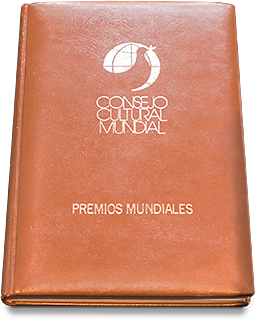
 Albert Einstein World Award of Science 2008
Albert Einstein World Award of Science 2008
Field of Research: Ribosomal Crystallography
Date: 11 November 2008
Place of Ceremony: Richardson Auditorium, Alexander Hall
Host Institution: Princeton University
Host Country: Princeton, New Jersey, USA
Prof. Ada Yonath, Professor of Structural Biology and Director of Helen & Milton A. Kimmelman Center for Biomolecular Structure and Assembly at the Weizmann Institute for Science in Israel received the 2008 Albert Einstein World Award of Science from Professor Shirley M. Tilghman, President Princeton University and Professor Edmond H. Fischer, President of the World Cultural Council.
It is a prize that recognizes Prof Yonath’s pioneering contributions to protein biosynthesis in the field of ribosomal crystallography and her introduction of innovative techniques in cryo-bio crystallography. These innovative techniques are now used routinely in many laboratories and many scientists have based their research on her discoveries.
Her work has revolutionized the field of structural biology and has given it wide-ranging applications, particularly in the development and design of new antibiotics.
In the late 1970s, Prof. Yonath began her unique pioneering work on protein biosynthesis by ribosomal crystallography, long before others thought it possible to crystallize such large complex structures. Her studies made it possible for scientists to determine the detailed structure of the ribosome, which has led to the discovery of the unified mechanism for the production of proteins. The experiments she conceived, including the development of novel techniques, were based on the introduction of state-of-the-art, ultra-cold bio-crystallography, an innovative method whereby temperatures of -185°C are used to minimize damage to the extremely sensitive ribosomal crystal during structural studies involving X-rays.
Her achievements include a singular pioneering work on the structure of over a dozen antibiotics and their interaction with ribosomes on the molecular level. This has paved the way to the understanding of antibiotic selectivity and the mechanism of drug action, synergy and resistance, thus inspiring the development and design of new antibiotic drugs.
She was born in Jerusalem, Israel. She graduated with a bachelor’s degree in Chemistry (1962) and a master’s degree in Biochemistry (1964) from the Hebrew University of Jerusalem, and earned a Ph.D. in X-Ray Crystallography at the Weizmann Institute of Science (1968). She has also accepted postdoctoral positions at Carnegie Mellon University (1969) and MIT (1970).
In 1970, Prof. Yonath returned to the Weizmann Institute and established what was, -for almost a decade- the only protein crystallography laboratory in Israel. After returning from a sabbatical year at the University of Chicago, she headed a Max-Planck Institute Research Unit in Hamburg, Germany (1986 – 2004) while continuing her research activities at the Weizmann Institute.
Prof. Ada Yonath is a member of the US National Academy of Sciences; the American Academy of Arts and Sciences; the Israel Academy of Sciences and Humanities; the European Academy of Sciences and Art; the European Molecular Biology Organization (EMBO) and the Academy of Astronautics.
Her awards and honors include the first European Crystallography Prize; the Kilby International Award, USA; the Israel Prize in Chemistry; the Cotton Medal of the US Chemical Society; the Anfinsen Award of the International Protein Society; the Louisa Gross Horwitz Prize of Columbia University, NY; the Israeli Prime Minister’s EMET prize; the Wolf Prize in Chemistry; the Linus Pauling Gold Medal; the UNESCO Award for Women in Science, representing Europe; and the Palade Gold Medal.
Prof. Yonath is widely considered the pioneer of ribosome crystallography. Her work has now become a cornerstone on which other scientists may continue the research she started.


